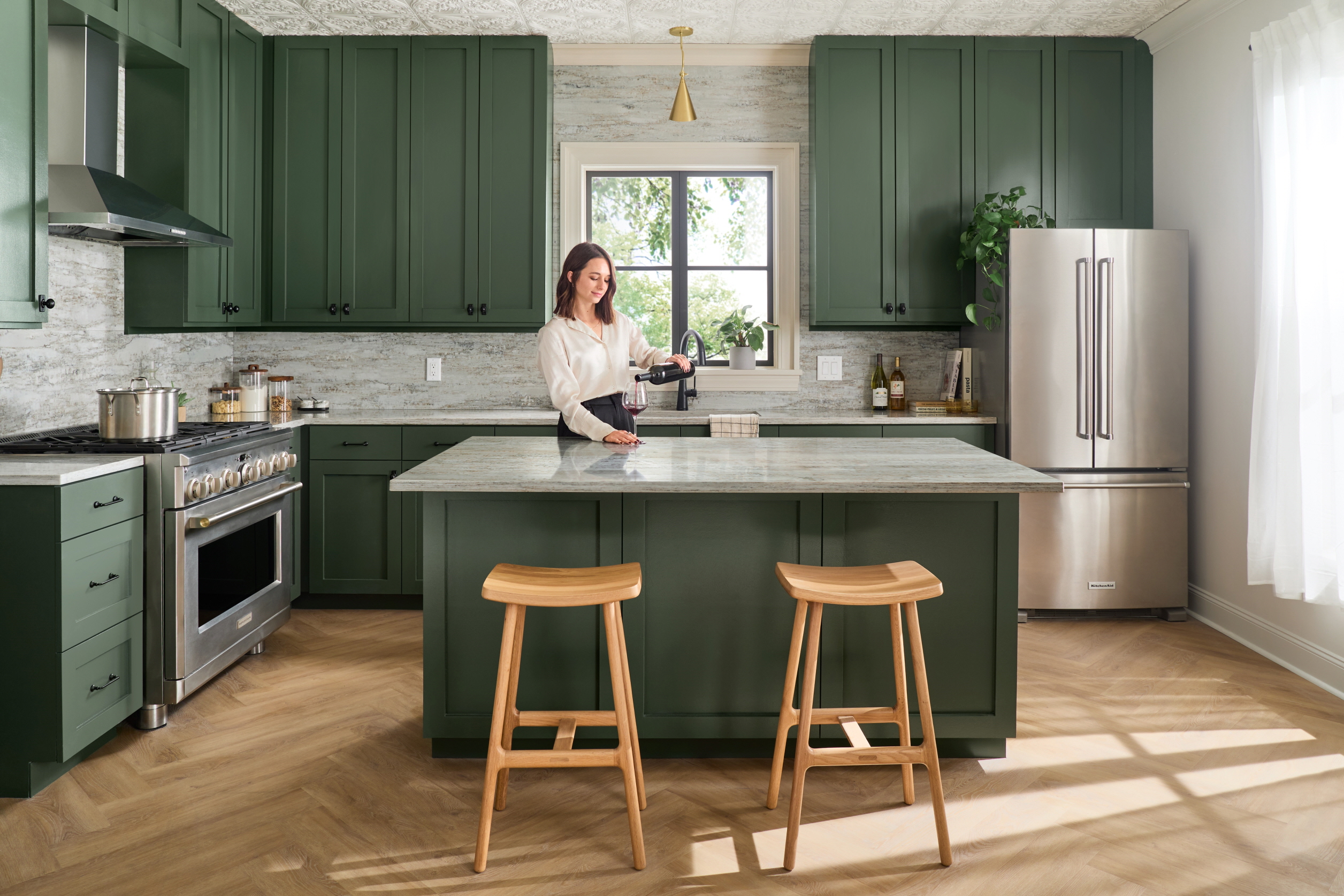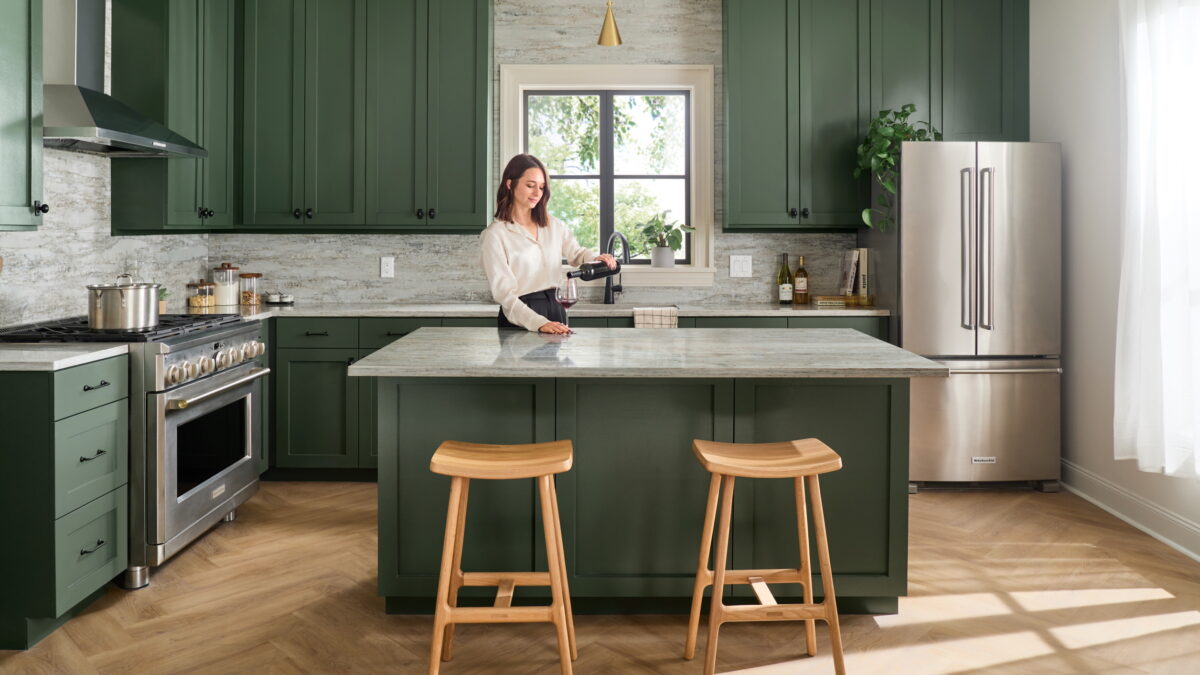Quartz kitchen countertops have become the go-to choice for many homeowners, prized for their sleek, natural aesthetic and exceptional durability. Renowned for their resistance to stains and scratches, these surfaces promise both beauty and endurance. In this article, we explore the fascinating composition of quartz countertops and unveil the cutting-edge manufacturing techniques that forge them. Additionally, we’ll analyze the expenses of incorporating a quartz countertop into your home and weigh their pros and cons. Perfect for anyone contemplating a kitchen makeover or those intrigued by the materials sculpting contemporary interiors, this guide offers a comprehensive examination of quartz’s allure.
Composition of Quartz Countertops
Quartz countertops, engineered marvels, consist predominantly of 90-95% natural quartz, making them extraordinarily hard and durable due to quartz being one of the most abundant minerals on the planet. This quartz is finely crushed and blended with 5-10% resins and polymers, acting as a binding agent that not only holds the material together but also significantly boosts its durability. The inclusion of resins imparts a non-porous characteristic to quartz countertops, rendering them resistant to stains, scratches, and moisture – a stark contrast to the regular maintenance and sealing required by natural stone surfaces. To cater to diverse aesthetic preferences, pigments are added to achieve an array of colors and patterns, enabling quartz to skillfully imitate the appearance of natural materials such as marble or granite. Additionally, some variations include recycled glass or metal flecks to craft distinctive designs. The culmination of this process yields a surface that is not only highly durable and low-maintenance but also visually appealing, making quartz countertops an exemplary choice for both kitchen and bathroom settings.

Manufacturing Process
The manufacturing journey of quartz countertops starts with sourcing and prepping high-grade quartz crystals, which are meticulously crushed into a range of sizes. The next step involves blending these particles with resins, polymers, and pigments, concocting a mixture that predominantly consists of 90-95% quartz, complemented by 5-10% binding agents. This composite is then accurately poured into molds tailored to define the countertop slabs’ dimensions and thickness.
To compact the mixture thoroughly and ensure no air pockets remain, the filled molds are subjected to a technique known as vibrocompression, which employs both vibration and pressure for a cohesive, dense slab. Following this, the slabs are transferred to a kiln and cured at approximately 185°F (85°C), a process that solidifies and strengthens the resin within.
Once cured, the slabs are cooled and demolded, then polished to achieve a sleek finish, whether it be glossy or matte according to preference. Subsequently, these slabs are precisely cut into desired shapes and sizes, accommodating any necessary spaces for sinks or cooktops. A rigorous final inspection is conducted to verify that each slab adheres to stringent quality standards, after which they are packaged and dispatched to either distributors or specific job sites.
Through this detailed and thorough manufacturing process, durable and aesthetically versatile quartz countertops are produced, enjoying popularity across both residential and commercial applications.
Cost of Quartz Countertops
The price of quartz countertops can fluctuate widely, influenced by a variety of factors such as the quality of material, thickness of the slab, choice of color and pattern, and even geographical location. Generally, the cost falls between $50 and $120 per square foot, encompassing both the materials needed and the labor for installation. The final price might climb higher with additional features like edge treatments, which contribute to the aesthetic appeal and functionality of the countertops but also lead to extra charges. Installation costs are another consideration, typically ranging from $30 to $70 per hour, though some installers might offer a flat rate based on the complexity of the project. Moreover, opting for custom fabrication—such as specialty shapes or unique cutouts—further elevates the overall expense. To secure the best value, it’s wise to gather and compare estimates from several suppliers and installation services.
Pros and Cons
Quartz countertops are celebrated for their remarkable durability, easy upkeep, and a broad spectrum of aesthetic choices. Their non-porous nature makes them resistant to stains, scratches, and moisture, sparing homeowners the hassle of periodic sealing. With a variety of colors and patterns available, quartz offers the ability to replicate the appearance of natural stones such as marble or granite, while ensuring consistent quality across the board. Moreover, the material’s resistance to bacterial growth stands out, especially in kitchen and bathroom settings, promoting a hygienic environment. The combination of durability and design flexibility has cemented quartz countertops as a sought-after choice in both residential and commercial domains.
Despite the numerous benefits, there are certain considerations to bear in mind with quartz countertops. One notable limitation is their vulnerability to heat damage; direct contact with hot cookware can lead to unsightly discoloration or even cracks. Additionally, despite its overall resilience, quartz might chip or crack under severe impact. The upfront cost of quartz countertops can also be a deterrent for those adhering to strict budgets, as it tends to be higher than some alternative materials. Furthermore, from an environmental perspective, the production of quartz countertops is not without impact, since it involves the use of synthetic resins and polymers, raising concerns about sustainability.

